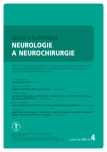Augmented Cervical Stabilisation for Failed Fixation in Patients with Severe Osteoporosis – Two Case Reports
Authors:
P. Barsa; R. Fröhlich; P. Suchomel
Authors‘ workplace:
Neurochirurgické oddělení, Neurocentrum, Krajská nemocnice Liberec, a. s.
Published in:
Cesk Slov Neurol N 2013; 76/109(4): 486-491
Category:
Case Report
Overview
The instrumented spinal fusion in patients with osteoporosis is challenging because of poor bone quality and difficult due to frequent instrument failure secondary to pullout of screws and intervertebral body fusion device subsidence, leading to revision procedures. The authors treated two severely osteoporotic patients presenting with hardware failure after an index procedure in cervical spine. Combined antero‑posterior stabilisation at multiple levels in conjunction with vertebroplasty of instrumented cervical vertebral bodies enabled reduced postoperative deformity and led to long‑term stability of the construct. Clinical experience obtained with these two patients support theoretical assumption that additional vertebroplasty not just strengthens osteoporotic vertebral bodies but also immediately anchors the screws and reduces a risk of intervertebral body device subsidence. Therefore, this seems to be a viable strategy for treatment of osteoporotic patients after cervical spine hardware failure.
Key words:
device failure – osteoporosis – internal fixation – polymethylmethacrylate vertebroplasty – cervical spine
Sources
1. Ponnusamy KE, Iyer S, Gupta G, Khanna AJ. Instrumentation of the osteoporotic spine: biomechanical and clinical considerations. Spine J 2011; 11(1): 54–63.
2. Barsa P, Suchomel P, Buchvald P, Lukáš R, Vaníčková E. Jsou bikortikální šrouby při přední krční fúzi skutečně bikortikálně zavedeny (retrospektivní studie)? Acta Chir Orthop Traumat Cech 2002; 69(1): 35–38.
3. Richter M, Wilke HJ, Kluger P, Claes L, Puhl W. Biomechanical evaluation of a newly developed monocortical expansion screw for use in anterior internal fixation of the cervical spine. In vitro comparison with two established internal fixation systems. Spine 1999; 24(3): 207–212.
4. Hasegawa T, Inufusa A, Imai Y, Mikawa Y, Lim TH, An HS. Hydroxyapatite-coating of pedicle screws improves resistance against pull-out force in the osteoporotic canine lumbar spine model: a pilot study. Spine J 2005; 5(3): 239–243.
5. DeWald CJ, Stanley T. Instrumentation-related complications of multilevel fusions for adult spinal deformity patients over age 65: surgical considerations and treatment options in patients with poor bone quality. Spine 2006; 31 (Suppl 19): S144–S151.
6. Sawakami K, Yamazaki A, Ishikawa S, Ito T, Watanabe K, Endo N. Polymethylmethacrylate augmentation of pedicle screws increases the initial fixation in osteoporotic spine patients. J Spinal Disord Tech 2012; 25(2): E28–E35.
7. Tan JS, Bailey CS, Dvorak MF, Fisher CG, Cripton PA, Oxland TR. Cement augmentation of vertebral screws enhances the interface strength between interbody device and vertebral body. Spine 2007; 32(3): 334–341.
8. Pitzen TR, Drumm J, Bruchmann B, Barbier DD, Steudel WI. Effectiveness of cemented rescue screws for anterior cervical plate fixation. J Neurosurg Spine 2006; 4(1): 60–63.
9. Waits C, Burton D, McIff T. Cement augmentation of pedicle screw fixation using novel cannulated cement insertion device. Spine 2009; 34(14): E478–E483.
10. Jung MY, Shin DA, Hahn IB, Kim TG, Huh R, Chung SS. Serious complication of cement augmentation for damaged pilot hole. Yonsei Med J 2010; 51(3): 466–468.
11. Zhuang XM, Yu BS, Zheng ZM, Zhang JF, Lu WW. Effect of the degree of osteoporosis on the biomechanical anchoring strength of the sacral pedicle screws: an in vitro comparison between unaugmented bicortical screws and polymethylmethacrylate augmented unicortical screws. Spine 2010; 35(19): E925–E931.
12. Phillips FM, Todd Wetzel F, Lieberman I, Campbell-Hupp M. An in vivo comparison of the potential for extravertebral cement leak after vertebroplasty and kyphoplasty. Spine 2002; 27(19): 2173–2179.
Labels
Paediatric neurology Neurosurgery NeurologyArticle was published in
Czech and Slovak Neurology and Neurosurgery

2013 Issue 4
- Advances in the Treatment of Myasthenia Gravis on the Horizon
- Hope Awakens with Early Diagnosis of Parkinson's Disease Based on Skin Odor
- Memantine in Dementia Therapy – Current Findings and Possible Future Applications
-
All articles in this issue
- Skull Base Surgery
- Conus Medullaris Arteriovenous Malformation – a Case Report
- Acute Encephalitis Caused by Influenza B Virus – a Case Report
- Trigemino‑ Cardiac Reflex and its Variations
- Genetic and Environmental Factors Involved in the Pathogenesis of Multiple Sclerosis
- Neuropsychiatric View of Huntington‘s Disease
- Endoscopic Endonasal Resection of Skull Base Meningiomas
- A Set of High Name Agreement Pictures for Evaluation and Therapy of Language and Cognitive Deficits
- Validation of the Slovak version of the Movement Disorder Society – Unified Parkinson’s Disease Rating Scale (MDS‑ UPDRS)
- The Importance of Vestibular and Posturographic Evaluation in Patients with Vestibular Schwannoma
- The Role of MR Diffusion Weighted Imaging in the Differential Diagnosis of Spinal Cord Lesions
- Endovascular Treatment of Indirect Carotid‑ Cavernous Fistula Using Surgical Approach via Superior Ophthalmic Vein
- Augmented Cervical Stabilisation for Failed Fixation in Patients with Severe Osteoporosis – Two Case Reports
- Dysembryoplastic Neuroepithelial Tumor and its Atypical Variant in Children – Case Reports
- Thalamic Germinoma in a Child with Symptoms of Precocious Pseudopuberty – a Case Report
- Difficulties Diagnosing Progressive Multifocal Leukoencephalopathy in Patients Infected with the Human Immunodeficiency Virus – Case Reports
- Guillain‑Barré Syndrome Associated with Breast Cancer Treated with Trastuzumab – a Case Report
- Czech and Slovak Neurology and Neurosurgery
- Journal archive
- Current issue
- About the journal
Most read in this issue
- Difficulties Diagnosing Progressive Multifocal Leukoencephalopathy in Patients Infected with the Human Immunodeficiency Virus – Case Reports
- Skull Base Surgery
- Neuropsychiatric View of Huntington‘s Disease
- Acute Encephalitis Caused by Influenza B Virus – a Case Report
